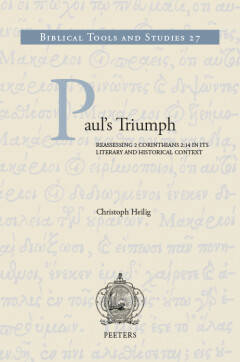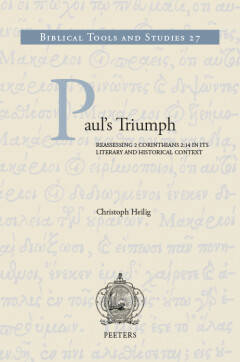
- Afhalen na 1 uur in een winkel met voorraad
- Gratis thuislevering in België vanaf € 30
- Ruim aanbod met 7 miljoen producten
- Afhalen na 1 uur in een winkel met voorraad
- Gratis thuislevering in België vanaf € 30
- Ruim aanbod met 7 miljoen producten
Zoeken
€ 174,45
+ 348 punten
Omschrijving
Paul's metaphorical language in Second Corinthians 2:14 has troubled exegetes for a long time. Does the verb 'thriambeuein' indicate that Paul imagines himself as being led to execution in the Roman triumphal procession? Or is, by contrast, the victory in view that the apostles receive themselves? Maybe the Roman ritual does not constitute the background of this metaphor at all? Clarity with regard to these questions is a pressing issue in Pauline studies, given the fact that this metaphor introduces a central passage in the Pauline corpus that is of crucial importance for reconstructing the apostle's self-understanding. Heilig demonstrates that, if all the relevant data are taken into account, a coherent interpretation of Paul's statement is possible indeed. Moreover, Heilig brings the resulting meaning of Paul's statement into dialogue with the political discourse of the time, thus presenting a detailed argument for the complex critical interaction of Paul with the ideology of the Roman Empire.
Specificaties
Betrokkenen
- Auteur(s):
- Uitgeverij:
Inhoud
- Aantal bladzijden:
- 354
- Taal:
- Engels
- Reeks:
- Reeksnummer:
- nr. 27
Eigenschappen
- Productcode (EAN):
- 9789042933927
- Verschijningsdatum:
- 9/01/2017
- Uitvoering:
- Hardcover
- Formaat:
- Genaaid
- Afmetingen:
- 168 mm x 246 mm
- Gewicht:
- 703 g

Alleen bij Standaard Boekhandel
+ 348 punten op je klantenkaart van Standaard Boekhandel
Beoordelingen
We publiceren alleen reviews die voldoen aan de voorwaarden voor reviews. Bekijk onze voorwaarden voor reviews.








